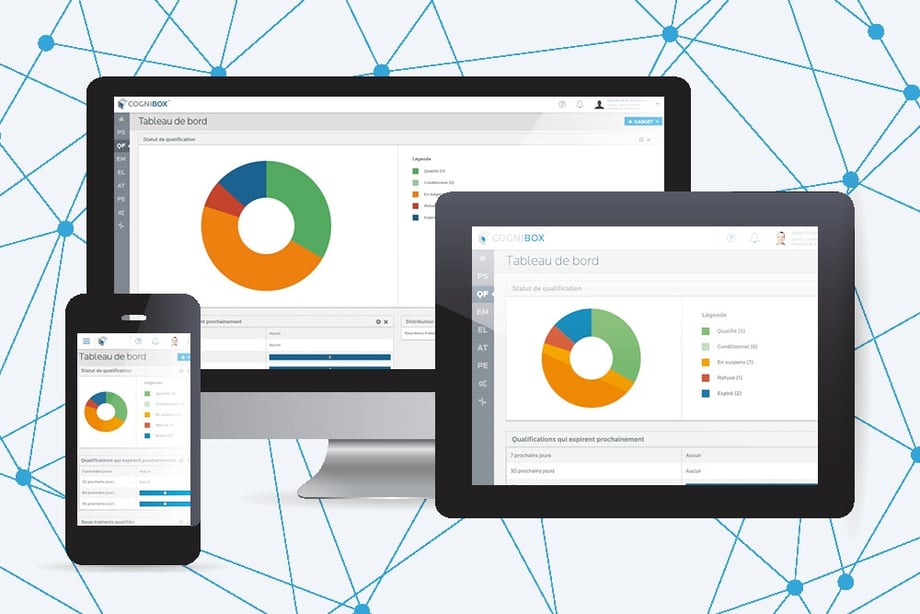So you’ve decided to take things in hand and invest in a Learning Management System (LMS) for your employees. But with so many to choose from, how on earth do you decide which one is right for you?
Any software application may read like a dream on paper. But beware, a beautiful presentation does not necessarily guarantee quality!
To be sure that you make the best choice, here are 10 things to keep in mind when choosing your future LMS.
1. User-friendly
The LMS will be your new best friend. As your main work tool, you will use it to carry out most of your tasks. Always bear in mind that your co-workers or successors may not necessarily be at ease with a computer. Therefore, the software you choose must be straightforward, intuitive and user-friendly so that you and your team enjoy using it.
This ease of use will enable you to involve different levels of management—from foremen to team leaders to supervisors—and to make them more easily accountable for managing training compliance.
2. Cross-department Use
Think about which of your organization’s other departments could benefit from this software. Consider the added value for both the training department and the entire company. By shopping around, the information you gather will allow you to keep an open mind on other LMS functionalities that might be worthwhile.
Here are some examples that may be of interest to departments, such as OHS, Quality and Environment:
- Centralization of all employee documents
- Management of work procedure requirements, including their different versions
- Management of the assessment of senior staff members’ organizational skills
3. Customization
Opt for an LMS where you can customize the categorization of your training catalogue, procedures and skills so that the data reflects your reality. This will also be reflected in tables and reports. The LMS should allow you to create tools—for example, labels to facilitate searches and reporting activities. In other words, look for a software with a flexible framework.
In addition, check if the vendor has its own development team and whether they are open to suggestions and new ideas for functionalities that would suit your needs better.
4. Scalable
Choose a system that offers functionalities that you will need now and in the future. Ask about the upgrade procedure: frequency, impact and suspension of services. Make sure that the software can easily be connected to other technologies and tools, such as your HR system or your access control systems.
What are your current and future needs? Today, the need that justifies an LMS may be the desire to quickly set up a structure to better manage training for approximately 30 employees, but who knows what it will be next year or in five years. For example, will the software continue to meet your needs following an acquisition or an expansion project? Switching systems is not an easy task. So, make sure that the software is able to support your company’s growth.
5. Useful Report Designs
Generating reports for comparing items or for an overall view of the situation is vital for good management. Are the performance indicators provided in the reports helpful, and do they give you the overview needed to improve monitoring of employee compliance? Are you able to search for data easily using different filters?
A LMS must, at the very least, allow administrators to:
- Generate and save customized reports for future use
- See a learner’s overall picture
- Sort information by employee, by requirement, by department, by job, etc.
- Export reports to another application, such as Microsoft Excel
- Include specific predefined variables
What’s the point of creating a number of reports if none of them provide the information you really need? Before deciding on a solution, test its functionalities and ask the representative to generate reports by simulating a real situation. In other words, ask for proof that the software can actually do what you want it to do!
6. Search Tool
LMS solutions offer various ways of searching content by using keywords, a date, a name, or a characteristic, for example. Make sure that the selected LMS has an excellent search tool that works quickly and accurately, taking into account your and your co-workers’ needs.
7. E-learning
The use of e-learning in companies has risen in an unprecedented manner thanks to its many advantages. The advent of e-learning facilitates the management of training— no need for classrooms or trainers.
To save your planning team time and to prevent training from expiring unnecessarily, make sure that the LMS has an automatic reassignment feature.
Complementary E-learning services
Very often, companies providing LMS software solutions also offer expertise in creating e-learning services. It may be a good idea to find out what services the e-learning vendor is offering.
- Does the application allow you to host training purchased elsewhere?
- Does the vendor have a dedicated team to help upload your training? What are its working hours; does it offer 24/7 support?
- Does the vendor have a team of educational technology specialists to help you create customized training in your company? Does the vendor have an end-user support team to help people who are having difficulties with the training courses?
8. Mobility
Nowadays, it is rarely necessary to install a software system to run on a desktop computer. More and more people are working from home or on the plant floor, using a tablet or a smart phone.
When choosing an LMS, ask if the basic functionalities are available on mobile devices and whether you can access LMS data anytime, anywhere. For example, can you quickly consult employee files directly from the plant floor?
9. Implementation and Services
Successful implementation is key to a rewarding software experience. Find out what type of services are provided by the company before, during and after implementation.
Although you may not have used an LMS solution to date, you have likely developed an internal system using Excel, Access or another database to manage employee information. Make sure that LMS implementation does not mean that you have to start from scratch by having to manually enter all the data in the new system.
When implementing the LMS, someone will be available to answer your questions. But, will you have all the support needed once this process is completed? Check whether the vendor offers such complementary services as data entry in the system or a dedicated expert to operate the software in your place, if required.
Expect to be bombarded with a number of questions following the implementation of a new LMS in your company. So, in addition to having an IT specialist, make sure you have a training specialist to guide and advise you throughout the process.
10. Security and Performance
Often forgotten or neglected because they are considered boring, security elements, in fact, have a very big impact. Ask about all LMS performance and security issues.
In other words, where will your data be kept? Will it be possible to recover all your data if you change your LMS? Will your data be hosted on a secure server, or on the Cloud, etc.? Is it a SaaS type of software? What are the guaranteed minimum uptime statistics?
Also, ask if there is a limit to the size and number of files that can be attached to support your data. Is the number of users limited by cost or by technical limitations? Is performance affected by the quantity of data and number of users running the software at the same time? Is the connection encrypted? How is access managed? Ask if data can be recovered, if needed. Is data backed up automatically? If yes, how often?
Key Consideration: Identify your needs
Before the LMS demonstration, clearly identify your needs. Think about your deficiencies and what you absolutely need to do with this tool.
How will this system facilitate your work? Who in the company will use this software and what are their technical abilities?
After noting all these items, discuss them with the representative. Ask the rep to advise and show you that the functionalities of the system clearly meet all your needs.
Discover the Cognibox Learning Management System >





